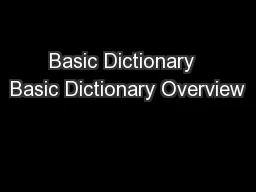PPT-RECOGNIZING COMPLEMENTS
Author : pasty-toler | Published Date : 2015-11-11
Complements The word complement comes from the Latin word complere which means to fill up or complete Complements COMPLETE the meaning of a verb What words are
Presentation Embed Code
Download Presentation
Download Presentation The PPT/PDF document "RECOGNIZING COMPLEMENTS" is the property of its rightful owner. Permission is granted to download and print the materials on this website for personal, non-commercial use only, and to display it on your personal computer provided you do not modify the materials and that you retain all copyright notices contained in the materials. By downloading content from our website, you accept the terms of this agreement.
RECOGNIZING COMPLEMENTS: Transcript
Download Rules Of Document
"RECOGNIZING COMPLEMENTS"The content belongs to its owner. You may download and print it for personal use, without modification, and keep all copyright notices. By downloading, you agree to these terms.
Related Documents














